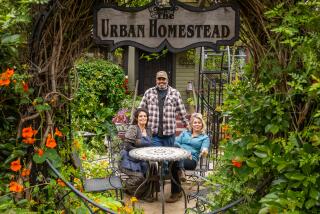Women adding a second (or third) job: farmer
- Share via
ALLENTOWN, PA — . -- In the early morning darkness, Kathy Fields rises, readies the ingredients to make cheese, washes and milks the cow and four goats, and turns out the horses to graze -- all before heading to one of her two other jobs.
A midwife and an assistant professor of nursing at Cedar Crest College in Allentown, Fields is among a growing number of women farmers who are sowing the seeds of joy.
While the number of Pennsylvania farms is falling, the number of women farmers has grown.
According to the latest U.S. Agriculture Department figures, the number of farms in the state fell 3.5% but the number of women farmers grew 21% from 1997 to 2002, the most recent five-year snapshot.
These ladies of the land often hold full-time jobs as they plant, tend and harvest. For them, farming is a labor of love. Many of the farms produce goods for niche markets: organic, heirloom or unusual vegetables, fruits, cheeses and other products.
For most, making money is not the goal.
“A lot of us are getting into farming later, as we get older,” Fields said. “We’re willing to toss sanity to the winds. It’s just a different focus for women.”
Ann Adams and Liz Brensinger grow 25 varieties of heirloom tomatoes, herbs and exotic vegetables on their 2-acre Green Heron Farm. They also have a consulting business for nonprofit groups, and Brensinger is an adjunct professor at East Stroudsburg University.
They sell their produce at a farmers market and to Adams’ son, Michael, a chef and restaurateur.
“Nobody would work this hard for so little without it being a passion,” Adams said.
Fields operates Flint Hill Farm with her sister, Anita Russo, and makes her own cheese, yogurt and butter from milk that is free of the growth hormone given to cows at most commercial dairies, spins wool from her sheep, and gathers eggs from her free-range chickens.
Fields sells her dairy products at the 28-acre farm and at a farmers market.
“For women, farming is not just a job, it’s a mission,” she said. Women have the “passion to continue when everything is saying it won’t work. We catch a vision.”
Carolyn Sachs, professor of rural sociology at Penn State University, said the number of women farmers was likely to increase.
“It seems like what we’re seeing is that more women are getting into farming as a second career,” she said. “They have gotten some resources to buy some land. I see this as something that’s going to continue.”
Sachs, a founder of the Pennsylvania Women’s Agricultural Network, said she hoped the organization would “help women scale up their operations” to make more money.
“Women tend to have smaller farms and less access to capital and credit,” she said.
Linda Moist, senior Penn State Extension associate with the network, said that there were many reasons women have turned to farming.
“My perception is that the number of women in farming is increasing for at least three reasons,” she said. “The average age of a farmer is 57, and some farm women are widowed now and farming alone. Young women are increasingly drawn to farming as a career, particularly organic and sustainable operations that involve direct marketing and can be profitable. And middle-aged or older women are leaving other careers and looking for a lifestyle change that allows them to live their values.”
Moist said a Penn State study found that female farmers listed these reasons for wanting to farm: love of nature, soil and farming; lifestyle choice; healthy food production and food security; sustainability and self-sufficiency; growing up on a farm; enjoying the outdoors; community.
Women are often seen as nurturers, which comes through in conversations with women who operate farms.
Adams, a former childbirth educator, said the rhythm of sowing, planting, nurturing and reaping mimicked the cycle of life. Readying the soil in early spring and sowing indoors in late winter is “incubating.”
“It’s like the beginning of life,” she said.
Then it’s on to planting, nurturing and waiting for the plants to mature. In the fall, it’s time to “clean up and get ready for the next rebirth,” she said.
Fields, whose farm is also an agricultural education center, said one young visitor declared she didn’t drink milk from an animal.
“Then where do you get your milk?” Fields asked.
“Wegmans,” the girl replied -- a grocery store.
Fields said there was a “disregard for life we eat from stores, a disconnect.” She wants to change that.
“We’re hoping, as we bring people to the farm,” that they will begin to respect the animal that has given its life to feed them, she said.
More to Read
Sign up for Essential California
The most important California stories and recommendations in your inbox every morning.
You may occasionally receive promotional content from the Los Angeles Times.










